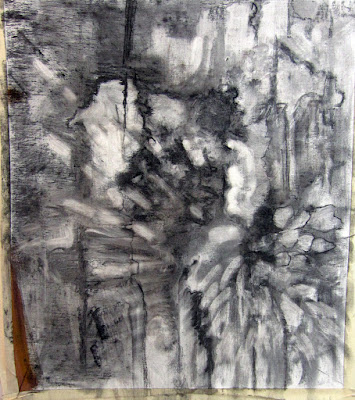Who cares if the Dunning-Kruger effect is measurable? We’ve all known people for whom it’s true.
 |
|
Wreck of the SS Ethie, oil on canvas, 18X24, $2318 framed |
When I couldn’t paint, I thought I knew everything. The more I learned, the more I realized I didn’t know. Now, I often finish a painting wondering if it’s any good at all.
I’m not unique in that—many experienced painters recount similar metamorphoses. I learned from author Van Reid that there’s a name for this: the Dunning-Kruger effect. Psychologists found that low-ability students thought they were much better at their subject than they actually were, while high-ability students downplayed their own skills.
 |
|
Deadwood, 30X40, oil on linen, $6231 framed |
It’s a hypothesis, because it hasn’t been proved yet, but it sure feels right.
An answer that “feels right” is one example of the kind of heuristic reasoning that inevitably leads to the Dunning-Kruger effect. Heuristics are mental shortcuts that match our current question to our prior experience. They may not provide perfect answers, but they give us quick ones. If it looks like a duck and quacks like a duck, we generally assume it’s a duck. If it turns out to be a shelduck instead, well, the error probably isn’t that important—unless you’re an ornithologist, in which case you already knew and thought the rest of us did, too.
The human mind is programmed to see patterns even where none exist. Modern life throws an amazing array of information at us every day. It’s no surprise that our overtaxed minds try to cut through the welter by using mental shortcuts. Sometimes they go spectacularly wrong.
 |
|
Quebec Brook, oil on canvasboard, 12X16, $1449 framed |
This phenomenon is something you’ve likely experienced in real life, especially if you spend much time on social media. A self-proclaimed ‘expert’ will begin spouting off at length, blissfully unaware of how silly he or she sounds. It might even be me.
As originally described by psychologists David Dunning and Justin Kruger, the bias results from two different problems. Low-ability people don’t perceive their own incompetence. “If you’re incompetent, you can’t know you’re incompetent, wrote Dunning. “The skills you need to produce a right answer are exactly the skills you need to recognize what a right answer is.”
On the other hand, people of high ability consistently overestimate the abilities of others. They erroneously presume that tasks that are easy to them will be easy for others as well.
|
Skylarking, oil on canvas, 24X36, $3985 framed |
The Dunning-Kruger effect has nothing to do with intelligence; in fact, really smart people are often supremely overconfident. That leads them into making complete asses of themselves in fields outside their own competence. Think, for a moment, of William Shatner’s music career, or Richard Dawkins on theology.
Who’s happier: the cock-sure, incompetent young painter, or the self-deprecating master? It’s a question nobody can answer. We can’t look at the past except through the filter of what we now know. As a teacher, I would hate to ruin anyone’s enjoyment of painting by making them a better painter. But there’s consolation in knowing that there are paint-and-sipnights for those who really don’t want to know what they’re doing.


